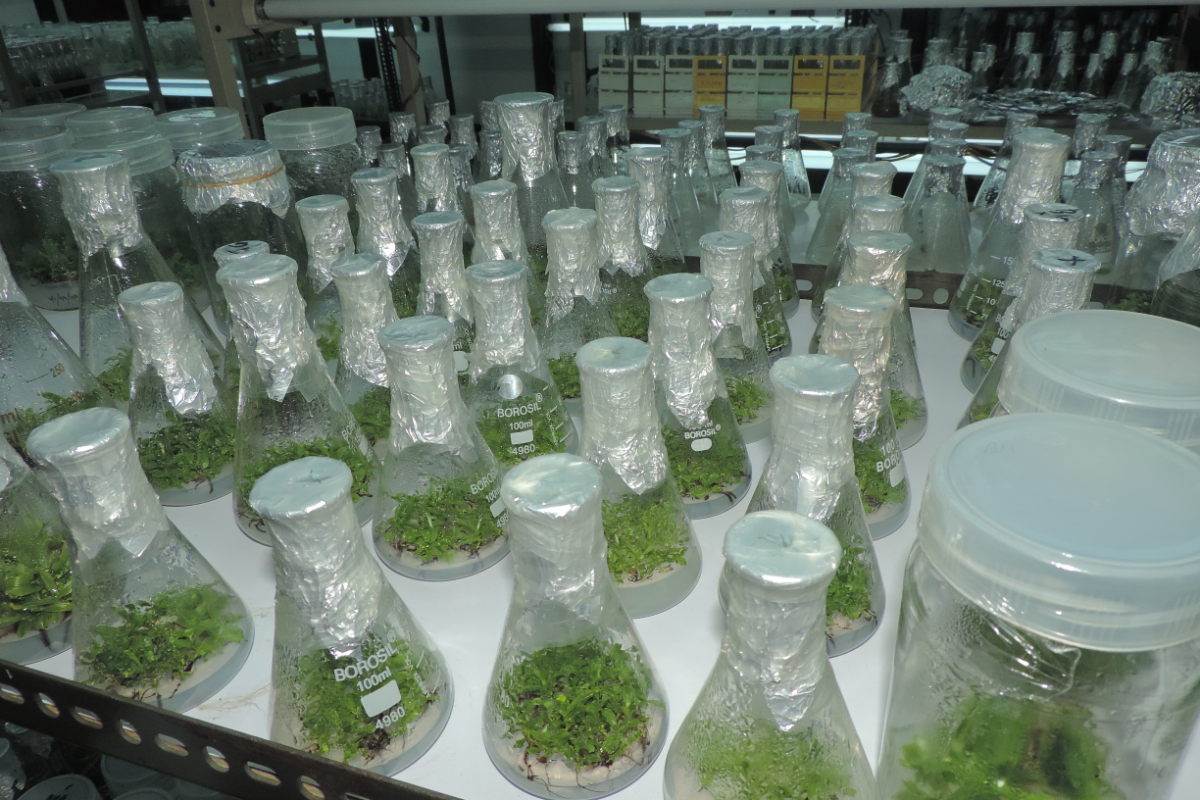अनुसंधान कार्यक्रम
क्रिप्टोगैम
एक्स-सीटू संरक्षण
एक्स-सीटू संरक्षण भारतीय वनस्पति सर्वेक्षण (बीएसआई) के प्राथमिक उद्देश्यों में से एक है | वास्तव में यह एक 'ऑफ़ साइट' संरक्षण नीति है जिसके तहत चिन्हित जाति को विभिन्न तकनीकों के द्वारा उसके मूल निवास स्थल जहाँ उसे विभिन्न खतरों का सामना करना पड़ रहा है से अपेक्षाकृत सुरक्षित स्थल में स्थान्तरित किया जाता है जैसे की बोटेनिकल गार्डेन, जूलॉजिकल गार्डेन, बीज बैंक या जीन बैंक आदि में | लुप्त होने के कगार पर एवं खतरे का सामना कर रहे प्रजातियों के अस्तित्व को सुनिश्चित करना तथा संबद्ध आनुवांशिक विविधता के रख रखाव को बढ़ावा देकर संरक्षण के रणनीतियों को पर्याप्त समर्थन करना इस तकनीक का मुख्य उद्देश्य है | यह इसका भी समर्थन करता है जबतक कि आकस्मिक कारक खतरे का सामना कर रहे जातियों के अस्तित्व एवं पुनर्निवासन के लिए सामान्य न हो जाए तब तक इन्हें सुरक्षित रखा जाए और फिर इन्हे इनके प्राकृतिक या मूल निवास में पुनर्निवासित किया जाए |
जैव विविधता सम्मलेन (सीबीडी) कि प्रस्तावना का अनुच्छेद 9 पूरक दृष्टिकोण के रूप में वानस्पतिक उद्यानों की स्थापना की आवश्यकता पर जोर देती है जिससे खतरे का सामना कर रहे मूल उद्गम देश के जातियों एवं पादपों को इन-सीटू संरक्षण (प्राकृतिक आवास में ही पादपों/ जीव जातियों को संरक्षित करना ) के कार्य एवं उनको लुप्त होने से बचाने के लिए उचित कदम उठाए जा सके | सीबीडी के निर्देशों के अनुरूप,बीएसआई देश के पादप सम्पदा का संरक्षक होने के नाते (यहाँ तक की सीबीडी के अस्तित्व में आने के पहले ही बीएसआई ने इस दिशा में कार्य प्रारम्भ कर चूका है ) इसने कई सुव्यवसथित छोटे एवं बड़े उद्यानों को देश के विभिन्न भौगौलिक पट्टियों में विशेषकर इसके विशाल स्थानिक एवं खतरे का सामना कर रहे पादपों को संरक्षित करने के लिए स्थापित किया है | कुछ केंद्रों में बीजों के भंडारण,पराग संरक्षण,पादप टहनी के संरक्षण के लिए निम्न ताप के साथ साथ उत्तक संवर्धन पद्धतियों का प्रयोग किया जा रहा है | भारतीय वनस्पति सर्वेक्षण के अधीन वानस्पतिक उद्यान/ एक्स-सीटू संरक्षणालय निम्न हैं
भारत के वनस्पति सर्वेक्षण के नियंत्रण में वनस्पति उद्यान / पूर्व स्थिति संरक्षण इस प्रकार हैं:
|
Sl. No. |
Name of the Botanic Garden/ Ex-situ conservatory |
Targeted groups |
Total number of species conserved |
|
1. |
Acharya Jagadish Chandra Bose Indian Botanic Garden, Howrah – West Bengal. (The erstwhile Royal Botanic Garden, Calcutta and Indian Botanic Garden, Howrah.): Estd.1787, Area- 273 acres |
A national repository of plants. Conserves important plant species of India and other countries. Represents a miniature of the world flora. |
1400 species approx. |
|
2. |
Botanic Garden of Indian Republic (BGIR), Noida, Uttar Pradesh
Estd: 2002, Area- 163.79 acres
|
An under construction garden, showcasing region’s wide variety of native flora. Plants from 23 states of the country are conserved. |
900 species |
|
3. |
Barapani Experimental Garden, Barapani & National Orchidarium, Shillong, Meghalaya
Estd: 1966 Area: 25 acres |
Orchids, Nepenthes, Insectivorous plants, Medicinal plants, Arboriculture species and other endemic threatened plants of North East India. Including well equipped tissue culture laboratory for micro propagation and storage of germ plasm. |
750 species approx.. |
|
4. |
Experimental Botanic Garden, Andaman & Nocobar Island, Dhanikari Area: 70 acres |
Endemic and threatened plants of Andaman & Nicobar Islands |
250 species approx... |
|
5. |
Experimental Botanic Garden, Arunachal Regional Centre, Sankie view Area: 110 acres |
Endemic and threatened plants of Arunachal Pradesh |
200 species approx. |
|
6. |
Experimental Botanic Garden & National Orchidarium, Yercaud, Tamilnadu under Southern Regional Centre, Coimbatore. Area; 40 acres |
Endemic orchids of Western & Eastern Ghats, Endemic plants of Western Ghats and others. Tissue culture laboratory attached. |
1200 species |
|
7. |
Experimental Botanic Garden, Western Regional Centre, Mundhwa,Pune Area: 38 acres |
Endemic and threatened plants of Maharashtra, Goa and Karnataka etc. |
500 species |
|
8. |
Experimental Botanic Garden, Sikkim & Himalayan, Regional Centre, Gangtok |
Endemic and threatened plants of Sikkim, Himalaya and Orchids of Sikkim etc. |
200 species |
|
9. |
Experimental Botanic Garden, Northen Regional Centre, Pauri Area; 35 acres |
National Gymnosperm collection and other Endemic plants |
750 species |
|
10. |
Experimental Botanic Garden, Northen Regional Centre, Khirsu Area: 18 acres |
‘Nature reserve’ and other Endemic and threatened plants of the area |
|
|
11. |
Experimental Botanic Garden, Northern Regional Centre, Dehradun Area; 5 Acres |
Endemic and threatened plants of Uttarakhand and Uttar Pradesh. |
350 species |
|
12. |
Experimental Botanic Garden, Arid Zone Regioal Centre, Jodhpur Area:12 acres |
Endemic and Threatened plants of Arid regions of Rajasthan and Gujarat, Cactus collections. |
185 species |
|
13. |
Experimental Botanic Garden, Central Circle, Allahabad, U.P. Area: 7 acres |
Endemic and threatened plants of Uttarpradesh and Madhyapradesh etc. |
600 species approx. |

